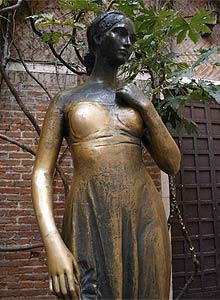Shakespeare gives us a vague ending to the book, as in the fate of three people, Friar Lawrence, Nurse, and Lord Capulet. In the story, however he gives us clues to how the people's fate may have turned out.
First of all, Friar Lawrence probably would have been jailed for a while then, most likely, released because he told the truth. If he had told a lie he probably would have been executed. "Romeo, there dead, was husband to that Juliet; And she, there dead, that Romeo's faithful wife" (Shakespeare 298). If he was to make up a lie for the reason that the two killed themselves the outcome of the story would be different. Even though that Friar Lawrence has to face a punishment, it is much better than the consequences he could have faced.
 The second person that we are going to talk about is Nurse. Nurse was more like Friar Lawrence, with the exception that she stayed with Juliet more than Romeo. I think that Friar Lawrence was more attached to Romeo than Nurse was. Nurse was just trying to make Juliet happy.
The second person that we are going to talk about is Nurse. Nurse was more like Friar Lawrence, with the exception that she stayed with Juliet more than Romeo. I think that Friar Lawrence was more attached to Romeo than Nurse was. Nurse was just trying to make Juliet happy. "Well, thou hast comforted me marvelous much..."(220). There are many examples of Nurse making Juliet more happy or comforting during hard times. Nurse can probably take the same or even less than the punishment of Friar Lawrence. Nurse was more of a messenger than the Friar. Sure, she did help in the marriage of Romeo and Juliet, but she did less than the Friar. I think that the Nurse should have less of a punishment than the Friar but she still should have a mild punishment.
Finally we come to Lord Capulet, the father of Juliet. Lord Capulet should have the biggest punishment of them all, he was the one that made Juliet want to take her own life. If he really valued the opinion of his daughter, than why did he force the marriage upon her? If Lord Capulet hadn't cared about who Juliet married we wouldn't be having this conversation in the first place. I believe that he should be banished or even stripped of his wealth for what he did to his daughter and what that did to Romeo. He did do one good thing, when he erected the statue in honor of Romeo and Juliet. "As rich shall Romeo's by his lady's lie, Poor sacrifices of our enmity" (302).
VOCAB
apprehend= arrest (someone) for a crime.
canopy= a covering, usually of fabric, supported on poles or suspended above a bed, throne, exalted personage, orsacred object.
contempt=the feeling with which a person regards anything consideredmean, vile, or worthless; disdain; scorn.
disperse=to drive or send off in various directions
inexorable=unyielding; unalterable.
interred =to place (a dead body) in a grave or tomb; bury.
penury=extreme poverty; destitution.
Remnants =a remaining, usually small part, quantity, number, or the like.
Righteous = characterized by uprightness or morality
